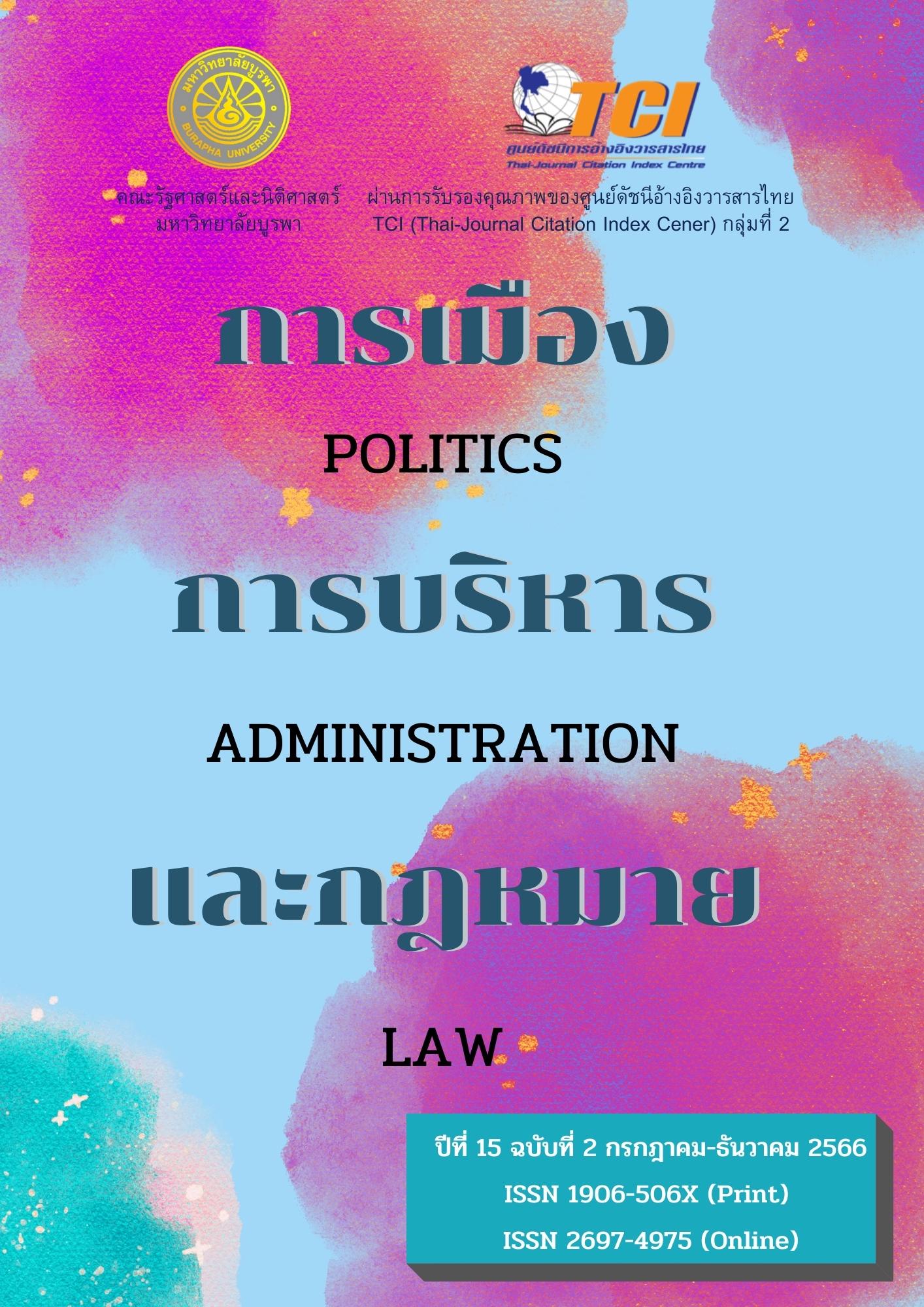ความพร้อมทางด้านกฎหมายของประเทศไทยในการเป็นภาคีอนุสัญญา ขององค์การยูเนสโก ว่าด้วยการคุ้มครองและการส่งเสริมความหลากหลาย ของการแสดงออกทางวัฒนธรรม ค.ศ 2005
คำสำคัญ:
อนุสัญญาว่าด้วยการคุ้มครองและการส่งเสริมความหลากหลายของการแสดงออกทาง วัฒนธรรม, ความหลากหลายของการแสดงออกทางวัฒนธรรม, อนุสัญญาขององค์การยูเนสโก ค.ศ. 2005บทคัดย่อ
การศึกษาครั้งนี้มุ่งที่จะศึกษาความพร้อมทางกฎหมายภายในประเทศไทยสำหรับการเข้าเป็นภาคีอนุสัญญาขององค์การยูเนสโกว่าด้วยการคุ้มครองและการส่งเสริมความหลากหลายของการแสดงออกทางวัฒนธรรม ค.ศ. 2005 โดยตรวจสอบกฎหมายที่เกี่ยวข้องกับความหลากหลายทางการแสดงออกทางวัฒนธรรม รวมถึงศึกษาเจตนารมณ์ หลักการ มาตรการและกลไกของอนุสัญญาฯ ที่จะมีผลต่อการเป็นภาคีอนุสัญญาฯ ตลอดจนปัจจัยอื่นที่เกี่ยวข้องในการเข้าร่วมเป็นภาคีและอนุวัติพันธกรณีตามอนุสัญญาฯ โดยเน้นการสร้างสมดุลระหว่างประโยชน์ของความร่วมมือและการแลกเปลี่ยนทางวัฒนธรรม รวมถึงการอนุรักษ์ความหลากหลายในการแสดงออกทางวัฒนธรรมกับภาพรวมและผลกระทบทางวัฒนธรรม สังคม กฎหมาย เศรษฐกิจ การเมือง และอื่นๆ ที่จะเกิดขึ้นกับสังคมไทยในอนาคต ตลอดจนความเป็นไปได้และแนวทางการนำไปปรับใช้กับบริบทของประเทศไทยได้อย่างเหมาะสม โดยที่ประเทศไทยได้แสดงเจตจำนงทางการเมืองในเชิงนโยบายที่จะเข้าเป็นภาคีอนุสัญญาฯ ผ่านการรับรองอนุสัญญาฯ ดังกล่าว เมื่อวันที่ 20 ตุลาคม 2548
การศึกษาพบว่าประเทศไทยมีความพร้อมทางกฎหมายที่จะรองรับการปฏิบัติตามพันธกรณีของอนุสัญญาฯระดับหนึ่ง อย่างไรก็ดี เนื่องจาก อนุสัญญาฯ ไม่ได้มีสภาพบังคับอย่างเข้มงวด ในทางตรงกันข้าม อนุสัญญาฯ มีความยืดหยุ่นและให้สิทธิอธิปไตยแห่งตน (Sovereign right) แก่รัฐภาคีค่อนข้างสูง สะท้อนให้เห็นถึง ความจำเป็นที่ประเทศไทยจะต้องมีการพิจารณาเพื่ออนุวัติการกฎหมายภายในประเทศเพื่อให้ประเทศไทยสามารถดำเนินการเพื่อให้เกิดการคุ้มครองและการส่งเสริมความหลากหลายของการแสดงออกทางวัฒนธรรมในประเทศอย่างมีประสิทธิภาพ ได้แก่ 1. การปรับปรุงกฎหมายที่กำหนดคำนิยามที่เกี่ยวข้องให้มีความชัดเจนและครอบคลุม เช่น ความหลากหลายของการแสดงออกทางวัฒนธรรม และสินค้าและบริการทางวัฒนธรรม 2. การปรับปรุงหรืออนุวัติการกฎหมายภายในประเทศในประเด็นที่เกี่ยวข้องสำคัญ ได้แก่ ด้านวัฒนธรรม ขยายความครอบคลุมให้รวมไปถึงประเด็นความหลากหลายของการแสดงออกทางวัฒนธรรมที่สามารถเชื่อมโยงกับการค้า 3. ด้านการค้าและทรัพย์สินทางปัญญา การแก้ไขปรับปรุงกฎหมายให้เอื้อต่อการเกิดผู้ประกอบการรายใหม่และรายย่อยที่เป็นผู้ผลิตสินค้าและบริการทางวัฒนธรรม รวมถึงผู้ประกอบการในอุตสาหกรรมวัฒนธรรมและอุตสาหกรรมสร้างสรรค์ 4. ด้านสื่อสารมวลชนและสภาพแวดล้อมดิจิทัล ปรับปรุงกฎหมายที่เกี่ยวกับการผลิตสื่อแบบเดิมและสมัยใหม่ โดยลดข้อจำกัดและการผูกขาดในการผลิตสื่อ 5. ด้านสิทธิและความเสมอภาค ปรับปรุงกลไกทางกฎหมายให้สามารถขจัดการเลือกปฏิบัติหรือลดผลกระทบจากการกระทำดังกล่าวให้น้อยที่สุด และ 6. ข้อเสนอให้ประเทศไทยอาจพิจารณาการจัดทำกฎหมายคุ้มครองและส่งเสริมความหลากหลายของการแสดงออกทางวัฒนธรรมเป็นการเฉพาะ โดยกฎหมายดังกล่าวต้องมีความครอบคลุมประเด็นที่เกี่ยวข้องที่กล่าวมาแล้ว
เอกสารอ้างอิง
สถาบันวิจัยเพื่อการพัฒนาประเทศไทย. (2564). โครงการศึกษาสถานะความพร้อมของประเทศไทยในการเข้าเป็นภาคีอนุสัญญา ว่าด้วยการคุ้มครองและการส่งเสริมความหลากหลายของการแสดงออกทางวัฒนธรรม. (รายงานฉบับสมบูรณ์). กรุงเทพฯ: กระทรวงวัฒนธรรม.
สุทธินี ยาวะประภาษ. (2552). ปัญหาของไทยในการเข้าร่วมอนุสัญญาว่าด้วยการคุ้มครองและการส่งเสริมความหลากหลายของการ แสดงออกทางวัฒนธรรม: ประเด็นด้านวัฒนธรรม. กรุงเทพฯ:กระทรวงการต่างประเทศ.
อมรา พงศาพิชญ์. (2564). สิทธิมนุษยชนในมิติวัฒนธรรมและศาสนา. วันที่ค้นข้อมูล 8 มีนาคม 2564,เข้าถึงได้จาก www.nhrc.or.th/getattachment/09e0f216-4ef6-427f-b62d-9a801520afee/.aspx
Donders, Y. M. (2021). Cultural rights in the Convention on the Diversity of Cultural Expressions: included or ignored?. Retrieved March 8, 2564, from https://dare.uva.nl/search?identifier=95888a51-78a6-4c66-b29d-124f0c78347c
Burri, M. (2010). Cultural Diversity as a Concept of Global Law: Origins, Evolution and Prospects. Diversity, 2(8). 1059-1084.
Burri, M. (2013). The UNESCO Convention on Cultural Diversity: An Appraisal Five Years after Its Entry into Force. International Journal of Cultural Property, 20, 357– 380.
Burri, M., & Nenova, C. B. (2008). Trade versus culture in the digital environment: an old conflict in need of a new definition. Journal of International Economic Law, 12(1), 17-62.
Neuwirth, R. J. (2006). “United in Divergency”: A Commentary on the UNESCO Convention on the Protection and Promotion of the Diversity of Cultural Expressions. Heidelberg Journal of International Law (HJIL), 66, pp. 819-862.
Nurse, K. (2008). Expert Report on Preferential Treatment (Article 16). In The UNESCO Convention on the Protections and Promotion of the Diversity of Cultural Expressions, 10 October 2008.
Smith, R. C. (2007). The UNESCO Convention on the Protection and Promotion of Cultural Expressions: Building a New World Information and Communication Order?. International Journal of Communication, 1, 24-55.
ดาวน์โหลด
เผยแพร่แล้ว
ฉบับ
ประเภทบทความ
สัญญาอนุญาต

อนุญาตภายใต้เงื่อนไข Creative Commons Attribution-NonCommercial-NoDerivatives 4.0 International License.






